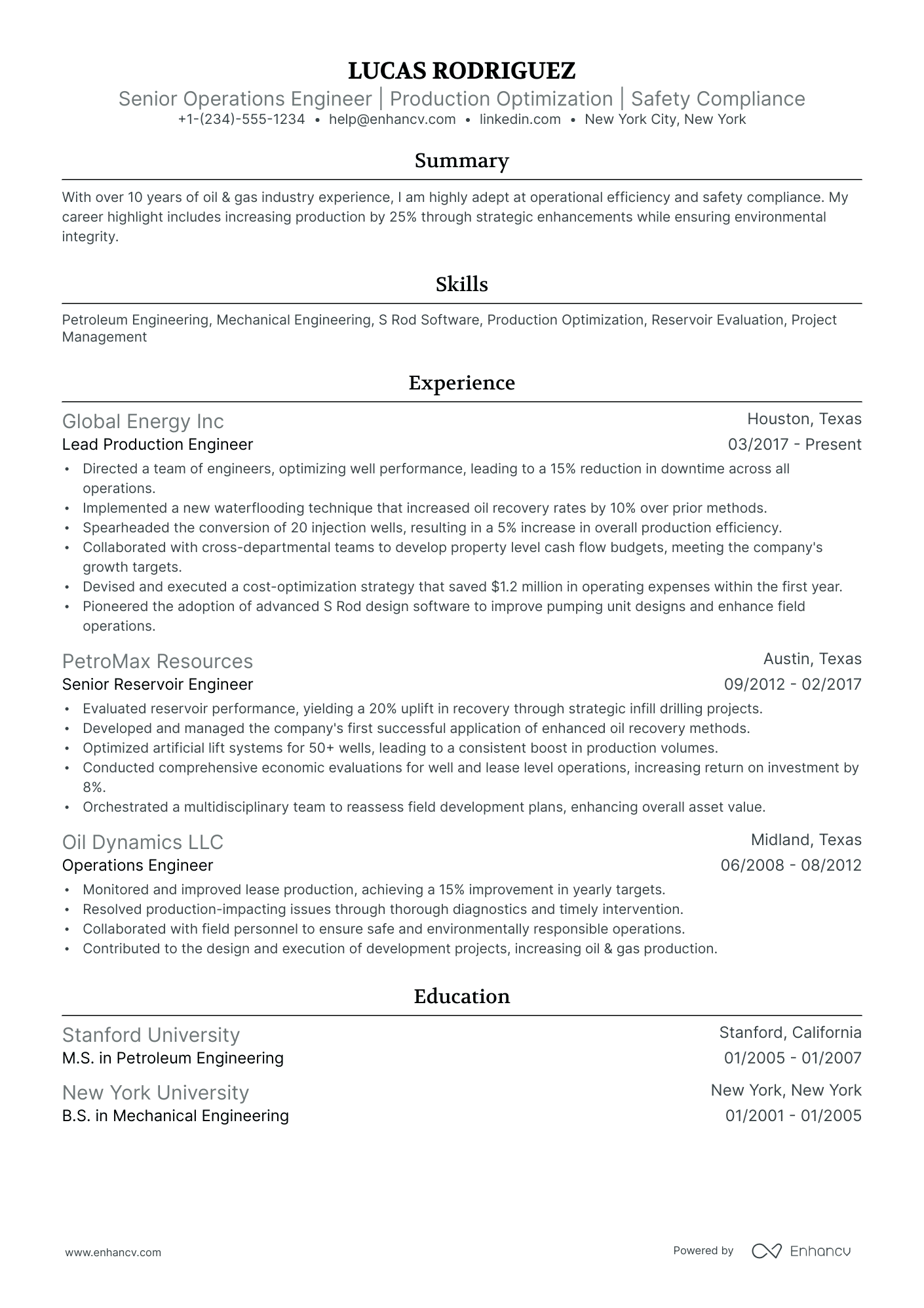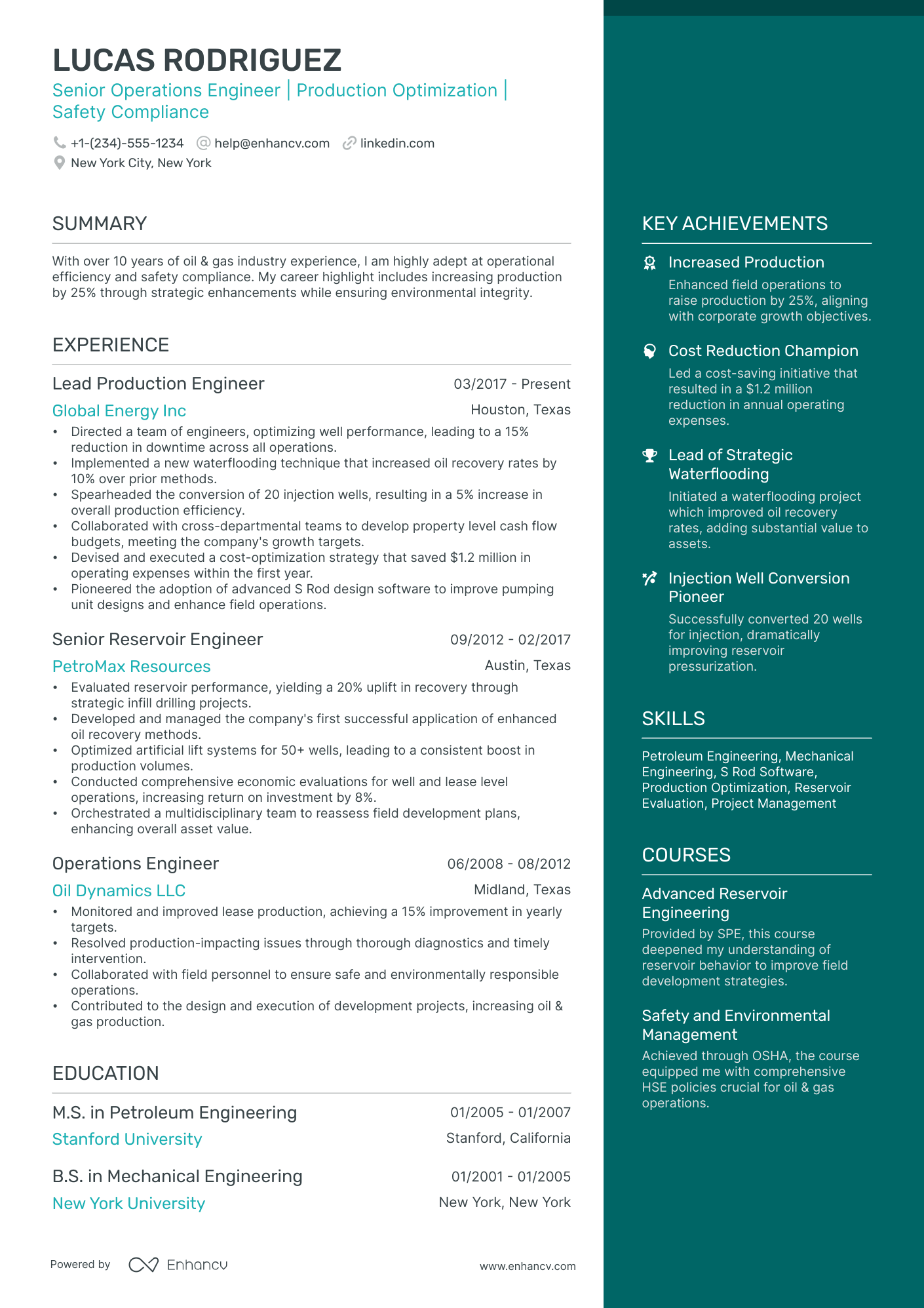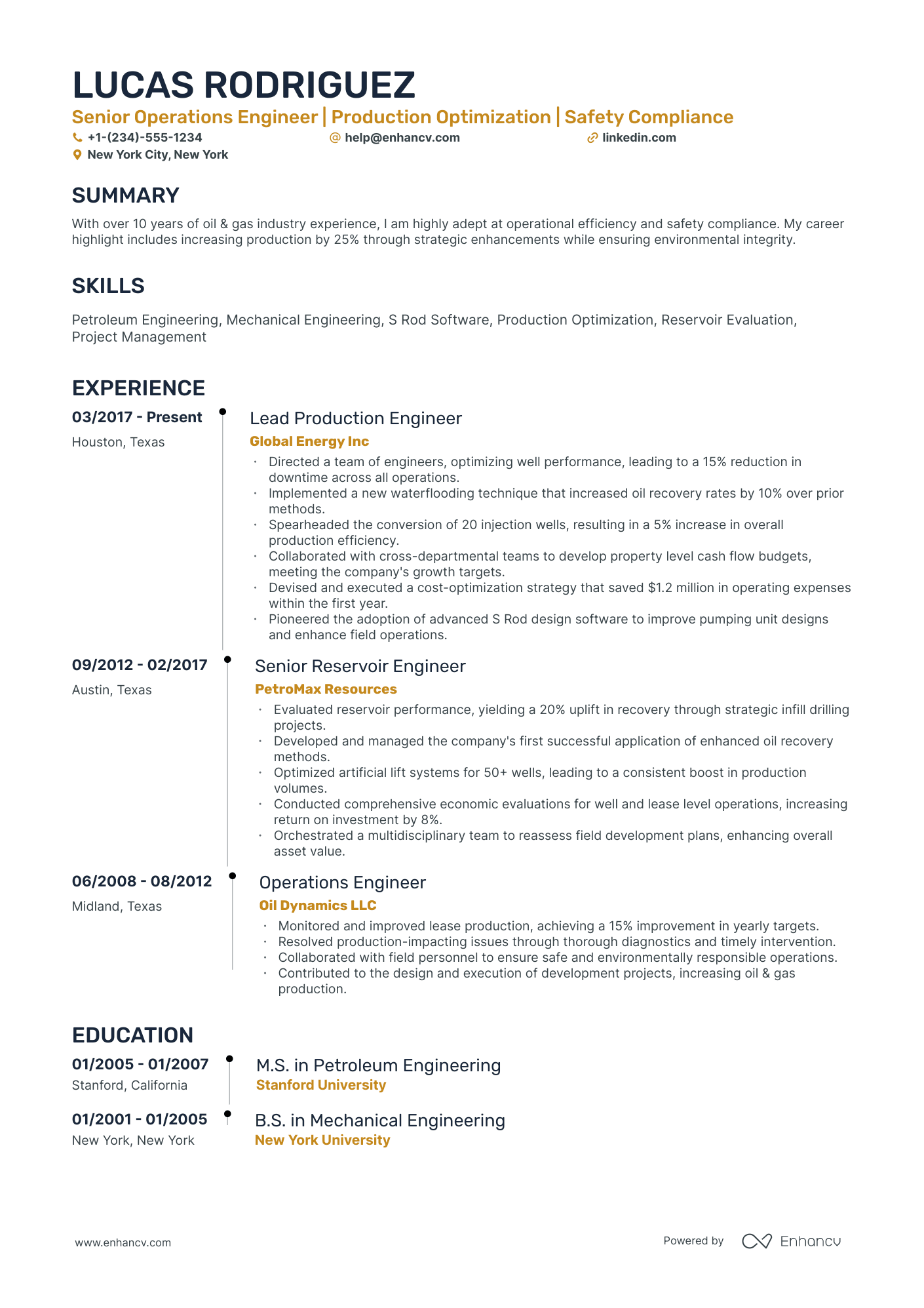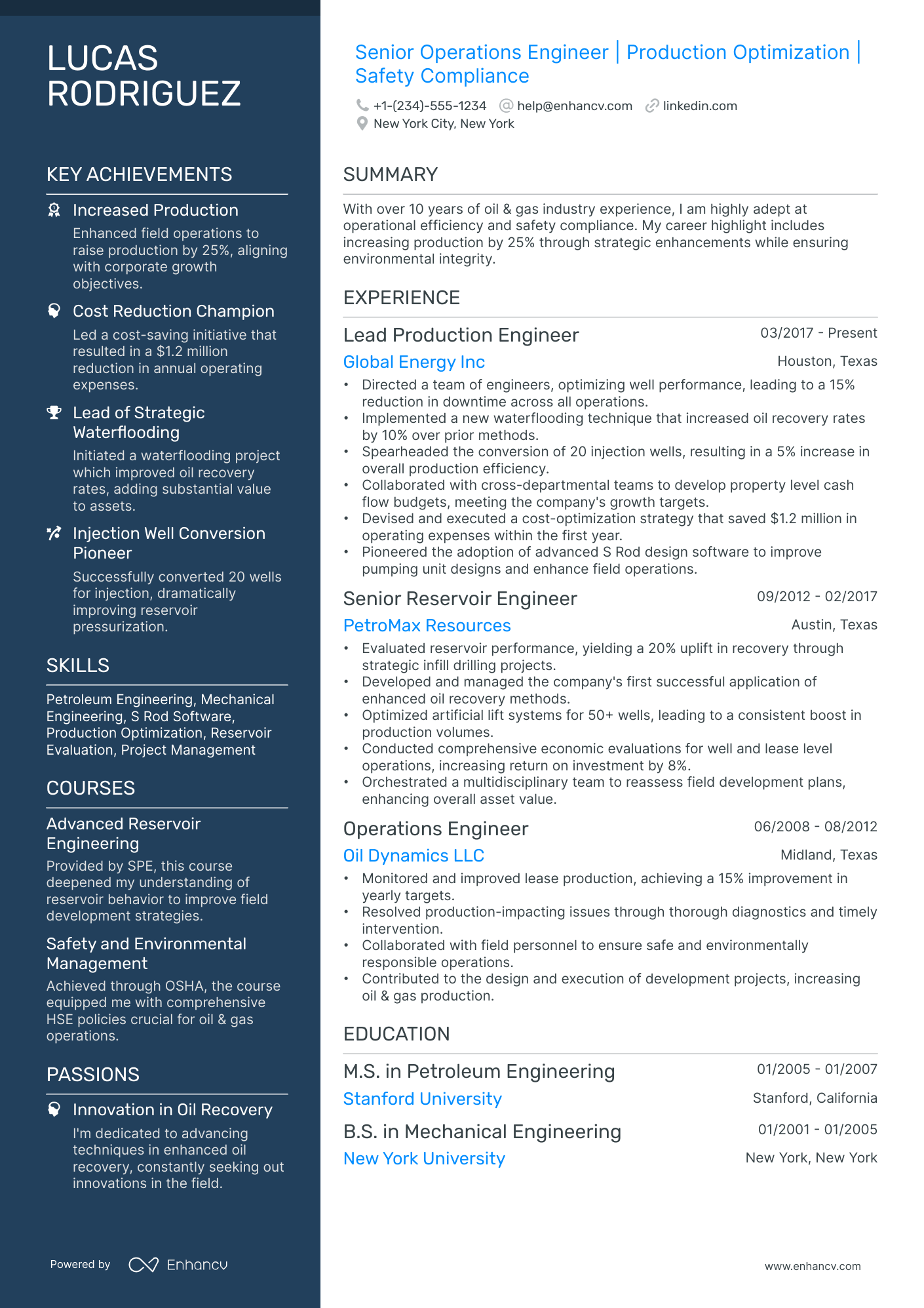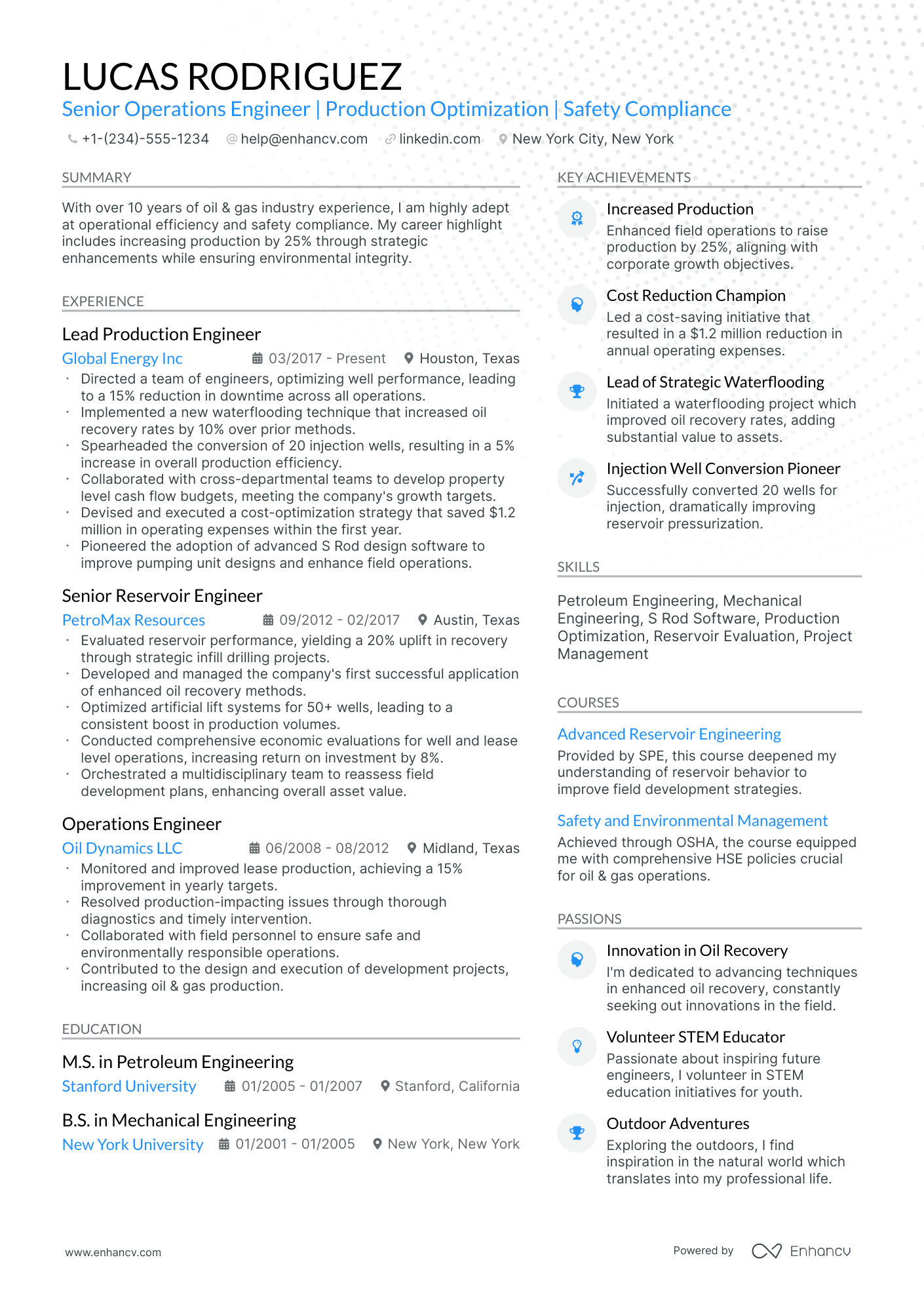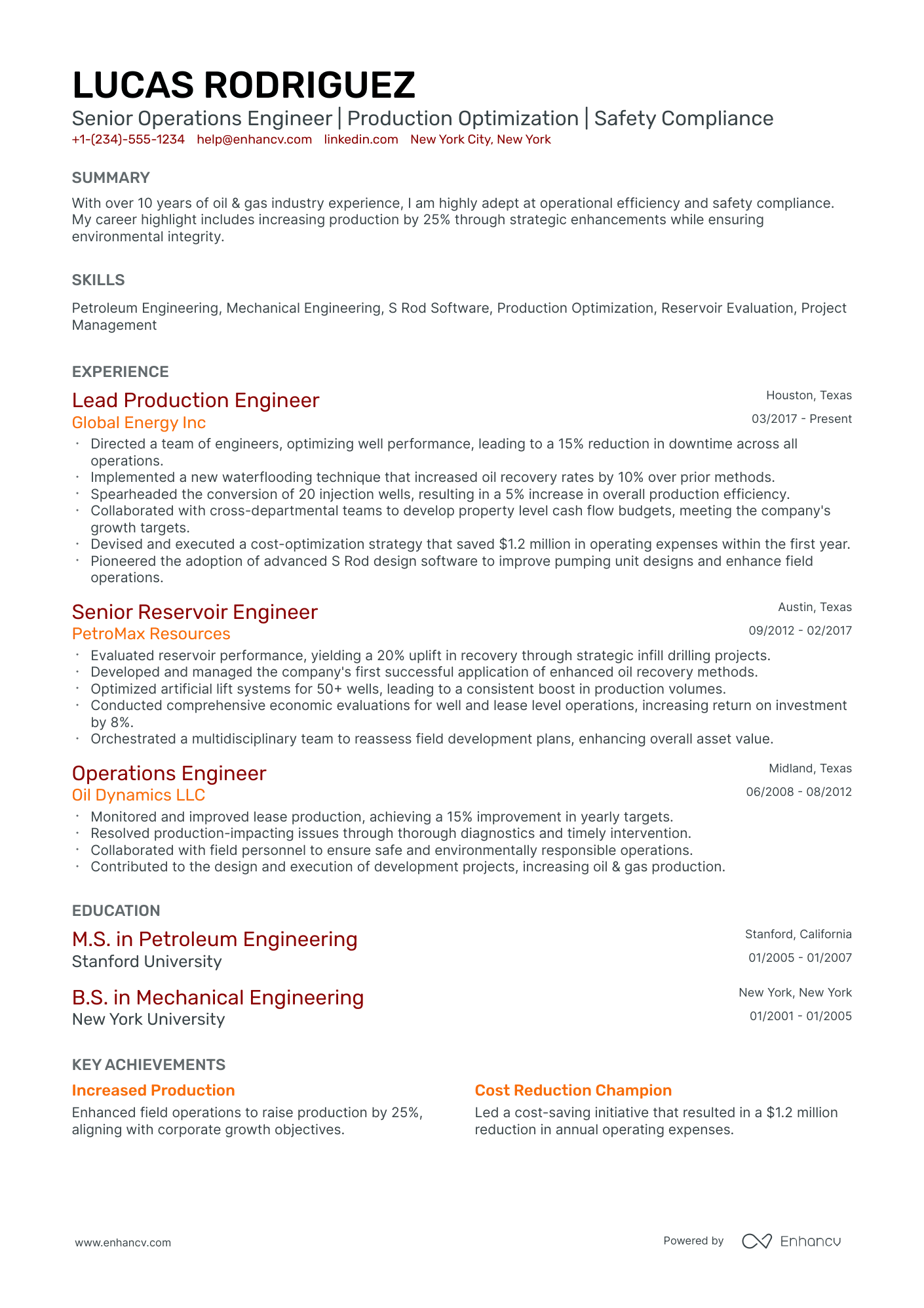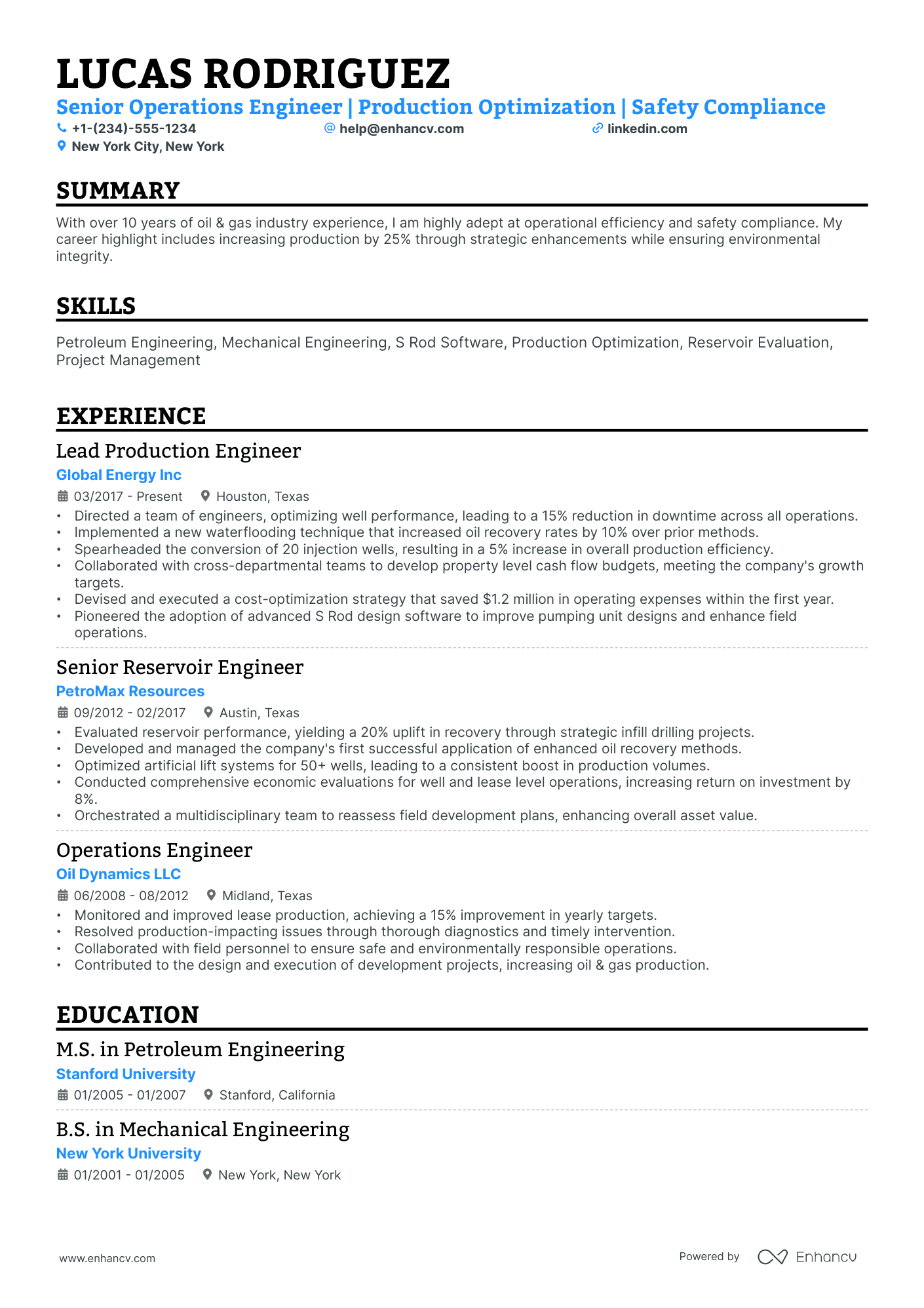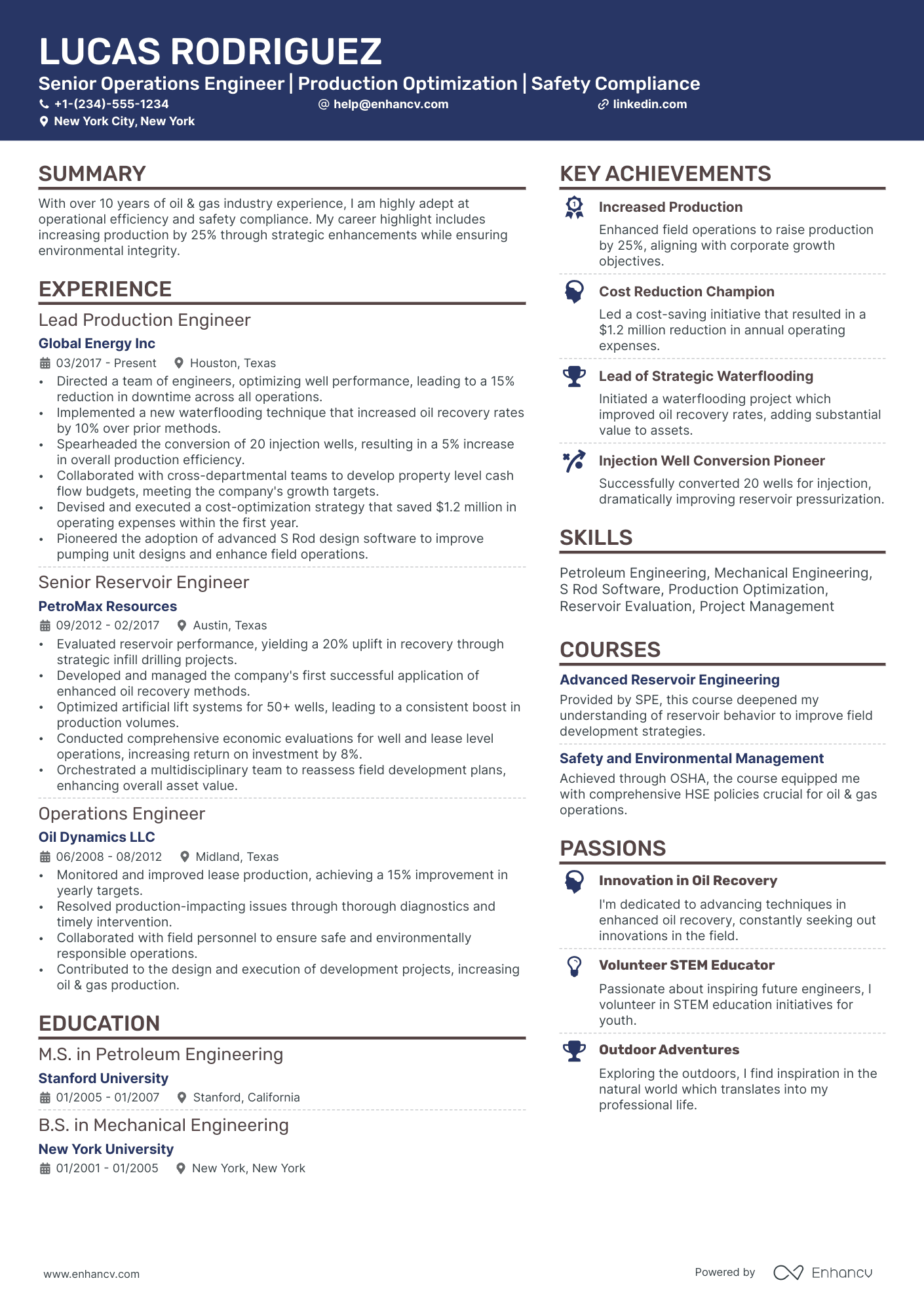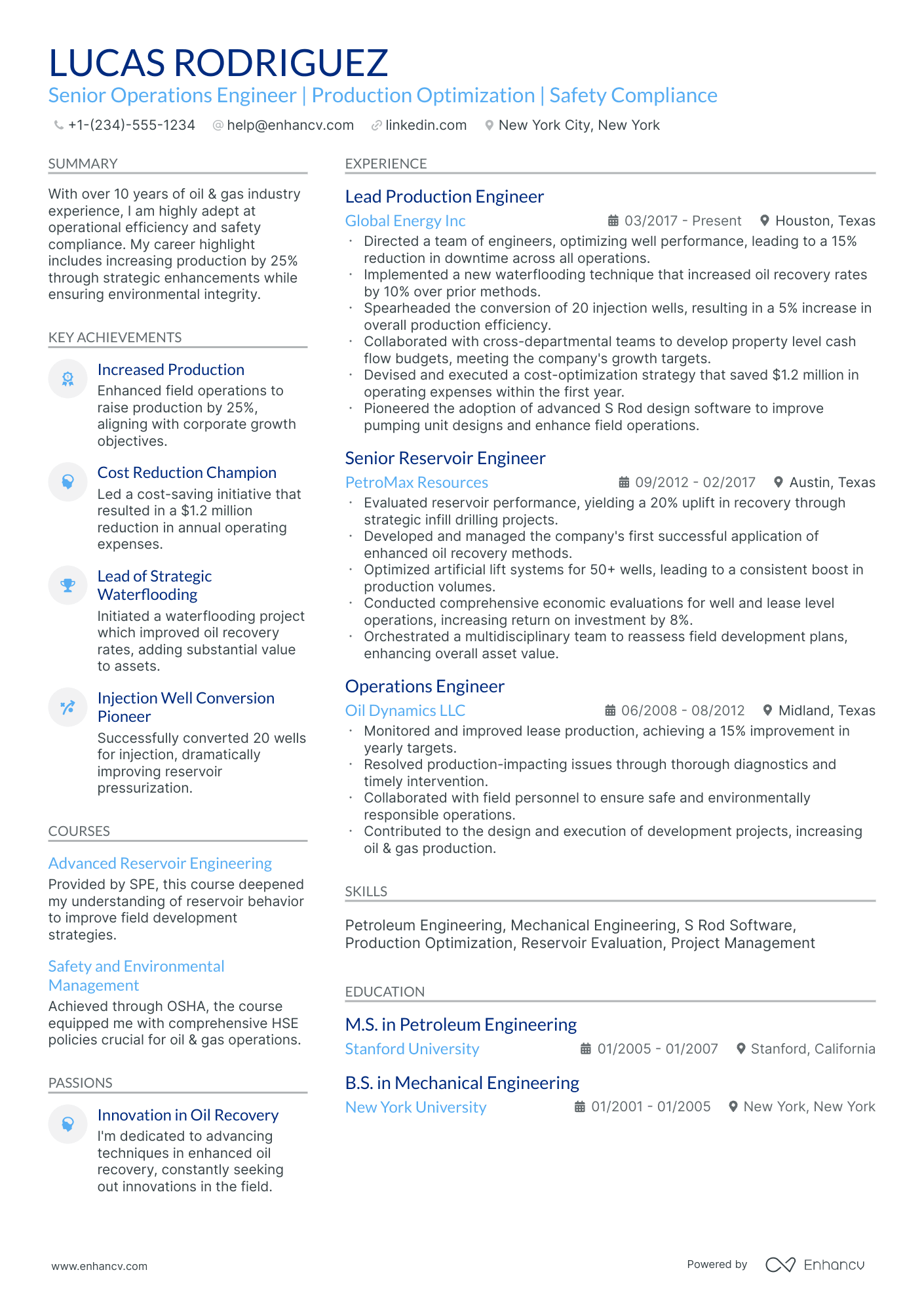As a petroleum engineer, articulating the complex technical skills and project experiences on your resume in a way that's easily understood by recruiters can be a significant challenge. Our guide provides clear examples and powerful language choices that will help you translate your in-depth industry knowledge into a compelling resume that stands out.
- Incorporate petroleum engineer job advert keywords into key sections of your resume, such as the summary, header, and experience sections;
- Quantify your experience using achievements, certificates, and more in various petroleum engineer resume sections;
- Apply practical insights from real-life petroleum engineer resume examples to enhance your own profile;
- Choose the most effective petroleum engineer resume format to succeed in any evaluation process.
- Director of Engineering Resume Example
- Construction Superintendent Resume Example
- Aerospace Engineering Resume Example
- Architectural Project Manager Resume Example
- Construction Manager Resume Example
- Automotive Engineering Resume Example
- Construction Worker Resume Example
- Electrical Manager Resume Example
- Geotechnical Engineering Resume Example
- Landscape Architect Resume Example
The ultimate formula for your petroleum engineer resume format
Our best advice on how to style your petroleum engineer resume is this - first, take the time to study the job advert requirements.
The resume format you select should ultimately help you better align how your experience matches the specific role.
There are four crucial elements you need to thus take into consideration:
- How you present your experience. If you happen to have plenty of relevant expertise, select the reverse-chronological resume format to organize your experience by dates, starting with the latest.
- Don't go over the top with writing your resume. Instead, stick with a maximum of two-page format to feature what matters most about your profile.
- Headers aren't just for "decoration". The header of your resume helps recruiters allocate your contact details, portfolio, and so much more.
- The PDF format rules. It's the most common practice to submit your petroleum engineer resume as a PDF so that your resume doesn't lose its layout. However, make sure the read the job well - in some instances, they might require a doc file.
Align your resume with the market’s standards – Canadian resumes may have unique layout guidelines.
Upload & Check Your Resume
Drop your resume here or choose a file. PDF & DOCX only. Max 2MB file size.
PRO TIP
If you're in the process of obtaining your certificate or degree, list the expected date you're supposed to graduate or be certified.
The key to your petroleum engineer job-winning resume - present your expertise with these sections:
- A header to make your resume more scannable
- Snapshot of who you are as a professional with your resume soft skills, achievements, and summary or objective
- Job advert keywords in the skills section of your resume
- Resume experience quantifying your past job successes with metrics
- A relevant education, certification, and technical sills section to provide background to your technological/software capabilities
What recruiters want to see on your resume:
- Proficiency in petroleum engineering software (such as PETREL, Eclipse, or Prosper) to showcase technical competency.
- Evidence of successful project management, highlighting experience in overseeing drilling operations, reservoir management, or production optimization.
- Strong grasp of reservoir engineering principles, including experience with reservoir simulation and enhanced oil recovery techniques.
- Demonstrated ability to work in multidisciplinary teams, reflecting collaboration with geoscientists, drilling engineers, and other specialists.
- Knowledge of industry regulations and safety standards, emphasizing a commitment to environmental stewardship and risk management.
What to include in the experience section of your petroleum engineer resume
The resume experience section is perhaps the most important element in your application as it needs to showcase how your current profile matches the job.
While it may take some time to perfect your petroleum engineer experience section, here are five tips to keep in mind when writing yours:
- Assess the advert to make a list of key requirements and look back on how each of your past jobs answers those;
- Don't just showcase you know a particular skill, instead, you need proof in the form of tangible results (e.g. numbers, percent, etc.);
- It's perfectly fine to leave off experience items that don't bring anything extra to your skill set or application;
- Recruiters want to understand what the particular value is of working with you, so instead of solely featuring technologies, think about including at least one bullet that's focused on your soft skills;
- Take care with wording each bullet to demonstrate what you've achieved, using a particular skill, and an action verb.
The below petroleum engineer resume examples can help guide you to curate your professional experience, following industry-leading tips and advice.
- Oversaw simulation and modeling of reservoir performance using advanced software, improving oil recovery predictions by 35%.
- Managed a team responsible for developing drilling programs and procedures that lead to a 20% reduction in project cost overruns.
- Liaised with geologists to integrate subsurface data into reservoir management plans, which enhanced oil field recoveries by 45 million barrels.
- Innovated new well testing techniques that increased accuracy in gauging reservoir potentials by over 25%.
- Led cross-disciplinary teams in the deployment of enhanced oil recovery projects that added an estimated 100 million dollars to the company's revenue stream.
- Coordinated with environmental scientists to ensure compliance with federal regulations, achieving a 100% clean audit over a three-year period.
- Played a pivotal role in the design and execution of horizontal drilling operations that accessed previously untappable reserves, boosting production rates by 40%.
- Piloted a real-time data acquisition system during drilling operations to optimize wellbore trajectories and improve well placement.
- Authored technical reports and publications on innovative drilling techniques that were recognized as industry benchmarks, receiving the SPE Drilling Excellence Award in 2017.
- Engineered and monitored hydraulic fracturing operations, contributing to a 50% increase in well productivity.
- Introduced a predictive maintenance program for well equipment, leading to a 30% decrease in unplanned downtime.
- Championed multi-stakeholder engagement initiatives that secured over 95% local community support for new extraction projects.
- Collaborated with geophysicists to deploy seismic acquisition technologies that refined reservoir mapping and increased estimated recoverable reserves by 60 million barrels.
- Executed cost-control strategies that resulted in a 15% year-on-year reduction in operating expenses for exploration projects.
- Developed a proprietary model for pressure transient analysis in complex geological formations, enhancing well performance evaluation.
- Implemented cutting-edge downhole measurement tools that resulted in better decision-making capabilities regarding well intervention needs.
- Reduced environmental impact by designing and supervising waste management solutions during drilling and production operations.
- Supervised the successful completion and testing of over 50 new wells, which are established producers still in operation today.
- Expertly managed offshore drilling projects, applying deepwater technologies that extended field life and improved recovery rates by an average of 25%.
- Developed a well performance monitoring system that utilized artificial intelligence to forecast potential downtimes and optimize production schedules.
- Instrumental in negotiating contracts with service companies that saved the company around 10% in annual operational expenditures.
- Designed bespoke well completion strategies for unconventional resources, elevating output to break-even points in underperforming assets.
- Served as a subject-matter expert in multi-stage fracturing operations, streamlining the process to enhance wellbore stability and longevity.
- Trained and mentored junior engineers, resulting in a 50% improvement in the technical team's project execution and efficiency.
The following content includes information from "O*NET OnLine" by the U.S. Department of Labor, Employment and Training Administration (USDOL/ETA). Used under the CC BY 4.0 license. The data represents the top responsibilities present on the task lists for petroleum engineer professionals.
Top Responsibilities for Petroleum Engineer:
- Specify and supervise well modification and stimulation programs to maximize oil and gas recovery.
- Monitor production rates, and plan rework processes to improve production.
- Maintain records of drilling and production operations.
- Analyze data to recommend placement of wells and supplementary processes to enhance production.
- Assist engineering and other personnel to solve operating problems.
- Direct and monitor the completion and evaluation of wells, well testing, or well surveys.
- Develop plans for oil and gas field drilling, and for product recovery and treatment.
- Assess costs and estimate the production capabilities and economic value of oil and gas wells, to evaluate the economic viability of potential drilling sites.
- Confer with scientific, engineering, and technical personnel to resolve design, research, and testing problems.
- Interpret drilling and testing information for personnel.
Quantifying impact on your resume
- Quantify the volume of petroleum you have successfully extracted in previous projects to demonstrate your direct contribution to resource acquisition.
- Include the percentage of cost savings achieved through optimization of drilling operations to show your ability to increase profitability.
- Detail the number of successful drilling projects managed, emphasizing your experience and reliability in project completion.
- List any reduction in environmental impact achieved, such as reduced carbon emissions, to highlight your commitment to sustainable practices.
- State any improvements in equipment efficiency, using specific percentages, to showcase your innovative approach to engineering challenges.
- Document the scale of cross-disciplinary teams you have led or collaborated with, indicating your leadership and teamwork skills.
- Mention the number of research papers or patents you've authored, reflecting your contribution to the field of petroleum engineering.
- Provide the magnitude of compliance with safety regulations by presenting your track record of incident-free operations.
Action verbs for your petroleum engineer resume
What can candidates do about their resume, if they have no experience
Job requirements can sometimes be answered by other elements you could make more prominent in your petroleum engineer resume.
Thus, you'd be substituting your lack of experience with your relevant:
- Education with details of skills you've obtained that align with the job
- Internships and short-term jobs that are once more dedicated to putting your expertise in the spotlight
- Skills section answering basic and - potentially - more specific job qualifications
- Strengths or accomplishments to show the unique value you present, even as a candidate with less or no professional experience in the industry.
Recommended reads:
PRO TIP
Showcase any ongoing or recent educational efforts to stay updated in your field.
In-demand hard skills and soft skills for your petroleum engineer resume
A vital element for any petroleum engineer resume is the presentation of your skill set.
Recruiters always take the time to assess your:
- Technological proficiency or hard skills - which software and technologies can you use and at what level?
- People/personal or soft skills - how apt are you at communicating your ideas across effectively? Are you resilient to change?
The ideal candidate presents the perfect balance of hard skills and soft skills all through the resume, but more particular within a dedicated skills section.
Building your petroleum engineer skills section, you should:
- List up to six skills that answer the requirements and are unique to your expertise.
- Include a soft skill (or two) that defines you as a person and professional - perhaps looking back on feedback you've received from previous managers, etc.
- Create up to two skills sections that are organized based on the types of skills you list (e.g. "technical skills", "soft skills", "petroleum engineer skills", etc.).
- If you happen to have technical certifications that are vital to the industry and really impressive, include their names within your skills section.
At times, it really is frustrating to think back on all the skills you possess and discover the best way to communicate them across.
We understand this challenge - that's why we've prepared two lists (of hard skills and soft skills) to help you build your next resume, quicker and more efficiently:
Top skills for your petroleum engineer resume:
Reservoir Simulation Software
Petroleum Production Engineering
Geological Modeling
Drilling Engineering
Well Logging Technologies
Enhanced Oil Recovery Techniques
Hydraulic Fracturing
Petrophysics
Geomechanics Software
Corrosion Engineering
Problem Solving
Team Collaboration
Communication
Analytical Thinking
Project Management
Adaptability
Attention to Detail
Critical Thinking
Leadership
Negotiation
Next, you will find information on the top technologies for petroleum engineer professonals from "O*NET OnLine" by the U.S. Department of Labor, Employment and Training Administration (USDOL/ETA). Used under the CC BY 4.0 license.
Top technologies for Petroleum Engineer’s resume:
- Google Analytics
- The MathWorks MATLAB
- Microsoft PowerPoint
- C#
- R
PRO TIP
Listing your relevant degrees or certificates on your petroleum engineer resume is a win-win situation. Not only does it hint at your technical capabilities in the industry, but an array of soft skills, like perseverance, adaptability, and motivation.
The petroleum engineer resume sections you may underestimate: certifications and education
Your education and certifications provide insight into both your technical capabilities and personal attributes, such as perseverance. When crafting your petroleum engineer resume, consider how you present these elements:
- For your higher education degrees, prioritize listing those most relevant to the job or indicative of your academic dedication;
- Include applicable coursework as a stand-in for relevant experience or if it might impress recruiters;
- Include incomplete higher education only if it's pertinent to meeting job requirements;
- If your degree is from a renowned university, mention how often you made the Dean's list to underline academic excellence.
Regarding certifications, it's not necessary to list all of them. Instead, match up to three of your most recent or significant certificates with the technical skills required in the job description.
Below, we've selected some of the top industry certifications that could be vital additions to your petroleum engineer resume.
The top 5 certifications for your petroleum engineer resume:
- Engineer in Training (EIT) - National Council of Examiners for Engineering and Surveying (NCEES)
- Professional Engineer (PE) - National Council of Examiners for Engineering and Surveying (NCEES)
- Project Management Professional (PMP) - Project Management Institute (PMI)
- Certified petroleum engineer (CPE) - Society of petroleum engineers (SPE)
- Offshore Safety Professional (OSP) - International Association of Drilling Contractors (IADC)
The content below includes information from "O*NET OnLine" by the U.S. Department of Labor, Employment and Training Administration (USDOL/ETA). Used under the CC BY 4.0 license. The data represents the top associations for petroleum engineer professionals.
Top US associations for a Petroleum Engineer professional
- Accreditation Board for Engineering and Technology
- American Association of Drilling Engineers
- American Association of Petroleum Geologists
- American Institute of Chemical Engineers
- American Institute of Mining, Metallurgical, and Petroleum Engineers
PRO TIP
Highlight any significant extracurricular activities that demonstrate valuable skills or leadership.
Recommended reads:
Practical guide to your petroleum engineer resume summary or objective
First off, should you include a summary or objective on your petroleum engineer resume?
We definitely recommend you choose the:
- Resume summary to match job requirements with most noteworthy accomplishments.
- Resume objective as a snapshot of career dreams
Both the resume summary and objective should set expectations for recruiters as to what your career highlights are.
These introductory paragraphs (that are no more than five sentences long) should help you answer why you're the best candidate for the job.
Industry-wide best practices pinpoint that the petroleum engineer resume summaries and objectives follow the structures of these samples:
Resume summaries for a petroleum engineer job
- With over 10 years of experience optimizing petroleum extraction for leading energy firms, this seasoned professional has spearheaded multiple high-yield offshore drilling projects. Proficient in hydraulic fracturing and reservoir management, they achieved a 20% reduction in production costs at their last position, showcasing exceptional problem-solving skills and efficiency.
- An accomplished chemical engineer with a decade's expertise in refining operations is eager to transition into petroleum engineering. Having developed innovative methods for maximizing product yield, they bring a proven track record of technological adaptation and process optimization, ensuring safer and more economical extraction methods.
- Seeking to leverage extensive experience in environmental consulting, this professional is poised to contribute to sustainable petroleum engineering practices. Knowledgeable in environmental impact assessments and remediation strategies, they aim to integrate eco-friendly solutions into petroleum extraction, with a focus on minimizing ecological disruption.
- A recent mechanical engineering graduate with a fervent interest in energy resources, determined to apply their analytical prowess and knowledge of thermodynamics to the realm of petroleum engineering. Eager to learn and contribute towards optimizing drilling processes and improve energy production efficiency in a hands-on environment.
- With 15 years in the field of petroleum engineering, focused on advancing extraction techniques, this expert has a significant track record, including increasing oil well production by 30% through the implementation of modern directional drilling methods. Skilled in software such as PETREL and AutoCAD, they have continuously exceeded production targets through strategic planning and innovation.
- An ambitious individual with a strong foundation in geology, looking to harness their passion for natural resource management by transitioning into petroleum engineering. They bring a unique perspective on stratigraphy and sedimentology, aiming to leverage these insights to enhance exploration and drilling operations within the oil and gas sector.
Optimize your resume summary and objective for ATS
Drop your resume here or choose a file.
PDF & DOCX only. Max 2MB file size.
Average salary info by state in the US for petroleum engineer professionals
Local salary info for Petroleum Engineer.” Source: My Next Move, National Center for O*NET Development. Accessed 10/15/2024
| State | Average Salary (in USD) |
|---|---|
| US National Average | $135,690 |
| California (CA) | $134,330 |
| Texas (TX) | $147,840 |
| Florida (FL) | $153,530 |
| Pennsylvania (PA) | $85,810 |
| Illinois (IL) | $136,190 |
| Ohio (OH) | $104,140 |
| Michigan (MI) | $108,520 |
Recruiters' favorite additional petroleum engineer resume sections
When writing your petroleum engineer resume, you may be thinking to yourself, " Is there anything more I can add on to stand out? ".
Include any of the below four sections you deem relevant, to ensure your petroleum engineer resume further builds up your professional and personal profile:
Key takeaways
We've reached the end of our petroleum engineer resume guide and hope this information has been useful. As a summary of our key points:
- Always assess the job advert for relevant requirements and integrate those buzzwords across various sections of your petroleum engineer resume by presenting tangible metrics of success;
- Quantify your hard skills in your certificates and skills section, while your soft skills in your resume achievements section;
- Ensure you've added additional relevant experience items, such as extracurricular activities and projects you've participated in or led;
- Use both your resume experience and summary to focus on what matters the most to the role: including your technical, character, and cultural fit for the company.
